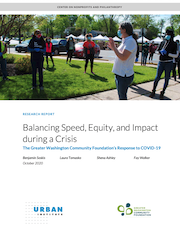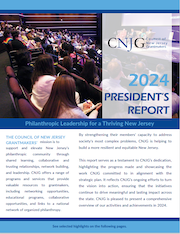... nonprofit partners, as the region moves from crisis relief to long-term recovery.” Community Foundation of ...
... on funding, and hear about upcoming programs regarding relief and recovery efforts for all disasters that affect New ... more information on the $10 million in financial relief for small businesses impacted by the...
Publication Date: November, 2015
This weekly conference call series welcomed New Jersey-based grantmakers along with national funders and provided an opportunity for grantmakers to hear from a wide range of experts in the field of disaster philanthropy. This series started on...
... COVID-19 – putting all possible resources into immediate relief, rather than holding back -- and planning for one or ...
... grant awards also included $7.5 million in Coronavirus Relief Funds, which were signed into law by Governor Murphy ...
... individual donors have supported a range of emergency cash relief for various crises throughout the years, and the ...
... and undocumented immigrants are ineligible for federal relief funds and government-sponsored safety-net programs. ...
Publication Date: November, 2015
This weekly conference call series welcomed New Jersey-based grantmakers along with national funders and provided an opportunity for grantmakers to hear from a wide range of experts in the field of disaster philanthropy. Series 1 started on November 5...
... the importance of donating to the New Jersey Pandemic Relief Fund CNJG Member Actions ...
... historical preservation, disaster response and relief, research, recreation, culture, and other areas ...
... all of NJ Grantmakers' efforts for COVID-19 response and relief. After this demonstration, we will hear from Linda ...
Publication Date: November, 2015
This weekly conference call series welcomed New Jersey-based grantmakers along with national funders and provided an opportunity for grantmakers to hear from a wide range of experts in the field of disaster philanthropy. This series started on...
... (3/11/13) Governor & Mrs. Christie's Hurricane Sandy NJ Relief Fund & Report on Ocean/Monmouth Tour (3/4/13) ...
... Inside Philanthropy: Pandemic Philanthropy: Moving From Relief to Power 5/5 – NY Times: In Philanthropy, Race Is ...
Publication Date: August, 2013
President Obama's Hurricane Sandy Task Force released this rebuilding strategy to serve as a model for communities across the nation facing greater risks from extreme weather and to continue helping the Sandy-affected region rebuild. The Rebuilding...
Publication Date: October, 2020
The COVID-19 public health and economic crisis has changed our world as we know it. As employers moved to remote work, schools shifted to distance learning, and businesses closed completely, it became clear that the impact on residents, nonprofits,...
... Libraries and the 2020 Census (8/1/2019) NJ Spotlight: Relief that $125M for upgrades to NJ libraries finally on the ...
Publication Date: August, 2025
CNJG's President's Reports
Publication Date: January, 2011
Sample disaster preparedness and recovery plans for foundations.
Publication Date: January, 2012
... and assistance to the government, promotion of health, relief of poverty or distress and other purposes that benefit ...


